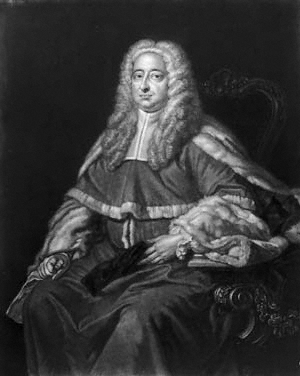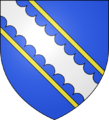William Fortescue (judge) facts for kids
Quick facts for kids
Sir William Fortescue
|
|
|---|---|
 |
|
| Master of the Rolls | |
| In office 5 November 1741 – 16 December 1749 |
|
| Preceded by | Sir John Verney |
| Succeeded by | Sir John Strange |
| Attorney General for the Duchy of Cornwall | |
| In office 1730–1736 |
|
| Preceded by | William Lee |
| Succeeded by | Robert Pauncefort |
| Personal details | |
| Born | 1687 |
| Died | 16 December 1749 (aged 61–62) |
| Nationality | British |
| Alma mater | Trinity College, Oxford |
| Profession | Barrister, judge, politician |
Sir William Fortescue PC KC (1687 – 16 December 1749) was an important British judge. He served as the Master of the Rolls from 1741 to 1749. This was a very high position in the legal system. He was also a talented writer and a good friend to famous poets and authors of his time. Fortescue came from Buckland Filleigh, a place in Devon, England.
Contents
Early Life and Family
William Fortescue was the only son of Henry Fortescue (1659–1691) and Agnes Dennis. His family lived at Buckland Filleigh. The Fortescue family had owned this land for many years. His ancestors were important people, including a Chief Justice of the King's Bench named Sir John Fortescue.
Education and Friendships
William Fortescue went to Barnstaple Grammar School in North Devon. There, he met the famous poet John Gay (1685–1732). They became lifelong friends. After school, he went to Trinity College, Oxford in 1705 to continue his studies.
Becoming a Lawyer and Judge
After his wife passed away early, Fortescue decided to become a barrister (a type of lawyer). He joined the Middle Temple in 1714 and then the Inner Temple in the same year. He officially became a barrister in July 1715.
Fortescue was known as a very good and practical lawyer. He built a strong career. In 1724, he started working in politics. He became the secretary for Robert Walpole, who was a powerful government official.
In 1727, Fortescue became a Member of Parliament for Newport. Even with his duties in Parliament, he kept working as a lawyer. In 1730, he became a King's Counsel, which is a special title for experienced lawyers. He also became the Attorney General to the Duchy of Cornwall that same year.
On February 9, 1736, he was appointed a Baron of the Exchequer, which is a type of judge. He then moved to the Court of Common Pleas on July 7, 1738. On November 5, 1741, he reached a very high position: Master of the Rolls. This role involved overseeing important legal records and cases. He also became a Privy Councillor. He held the Master of the Rolls position until he died in 1749.
Literary Connections
Besides his legal work, Fortescue was also involved in the London literary world. His friend John Gay introduced him to another famous poet, Alexander Pope. Fortescue became a founding member of the Scriblerus Club. This was a group of writers who made fun of bad writing and silly ideas. He even wrote with Pope on a piece called "Stradling versus Stiles." Pope also dedicated one of his poems, Imitation of the First Satire of Horace, to Fortescue.
Family Life
On July 7, 1709, William Fortescue married his cousin, Mary Fortescue. She was from a different branch of the Fortescue family. Sadly, Mary died early, on August 1, 1710. They had one daughter:
- Mary Fortescue (1710–1752). She inherited land from her mother. Mary married John Spooner, and they had a daughter, also named Mary, who died as a baby.
Death
Sir William Fortescue passed away on December 16, 1749, when he was 63 years old. He was buried in the Rolls Chapel in London.
Images for kids
 | Bayard Rustin |
 | Jeannette Carter |
 | Jeremiah A. Brown |


